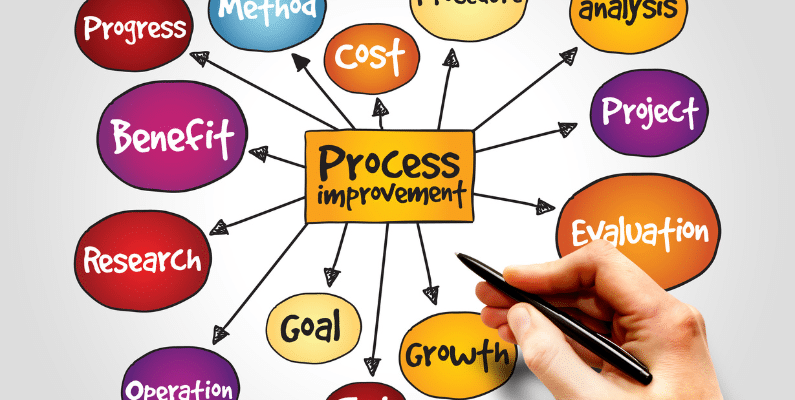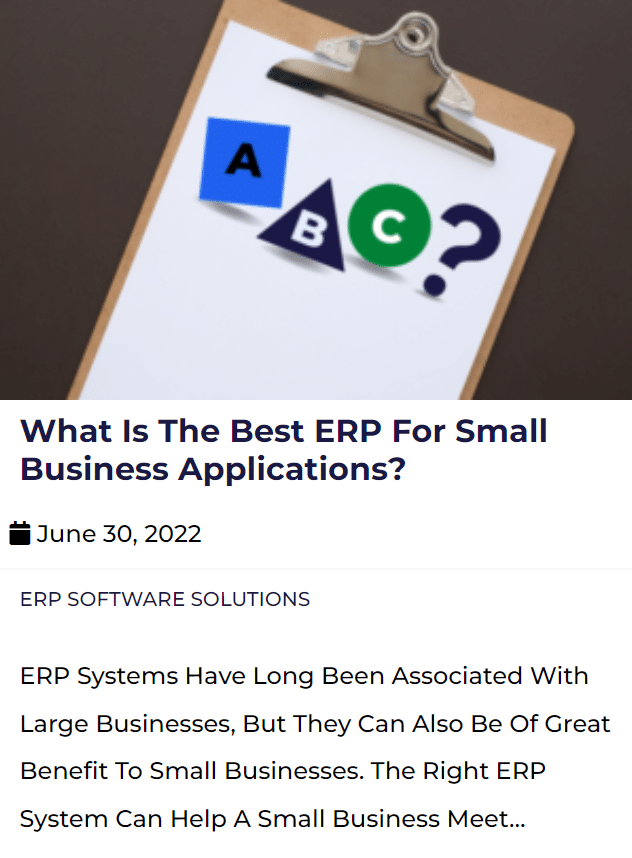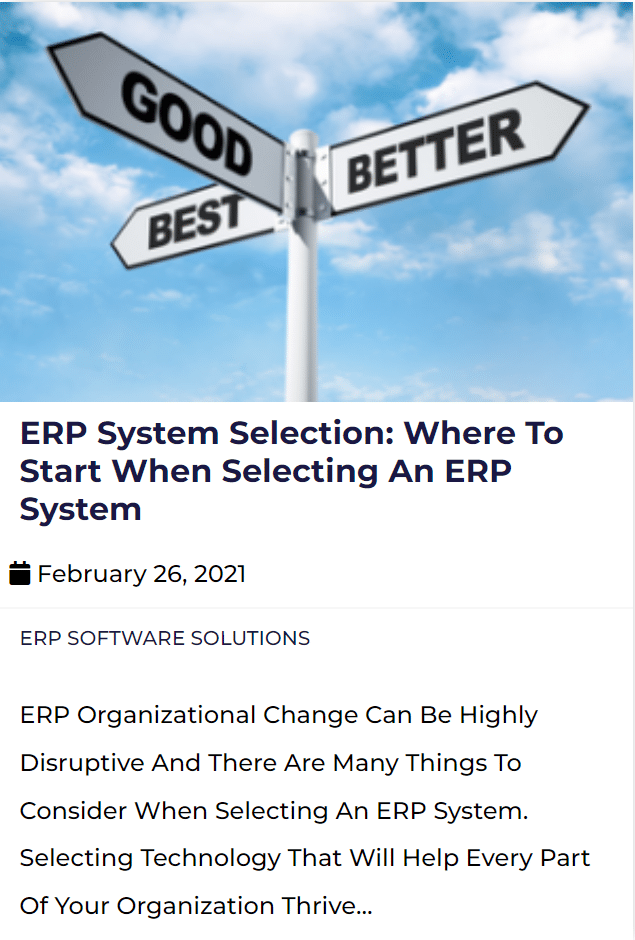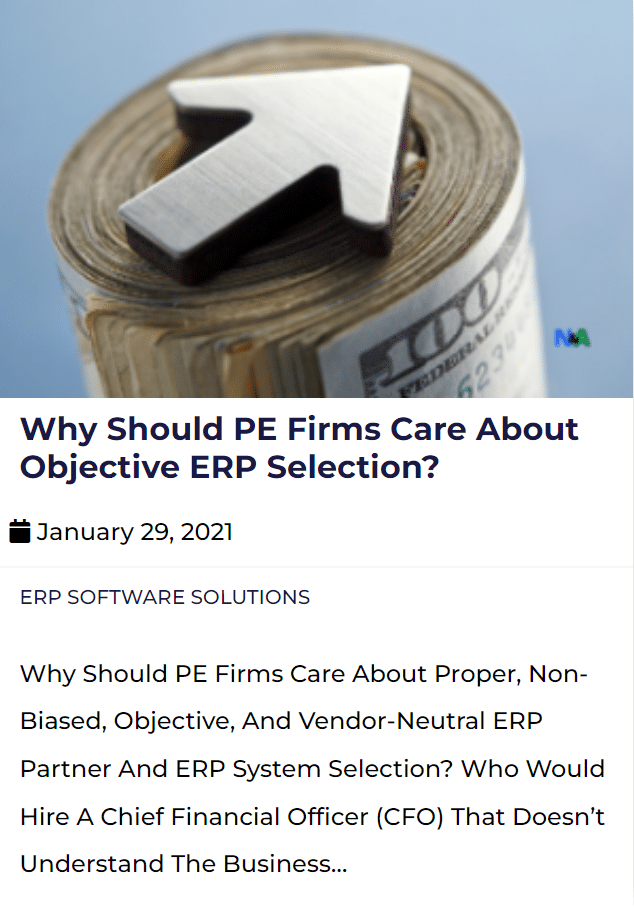ERP System Benefits
Enterprise Resource Planning (ERP) systems are renowned in the business world for their many benefits. Improved accuracy, visibility, timeliness of business information, increased process efficiencies, and improved integration of business units are powerful business advantages of an ERP system.
As we will discuss in more detail, some benefits of ERP systems are that they bring organizational advantages such as reduced operational costs, improved business process productivity, improved collaborative information sharing and dissemination, and improved customer service.
Additionally, the purpose of ERP is to allow the sharing and dissemination of information cooperatively within the organization but also extend the benefit of information sharing to suppliers and customers. By integrating all data and processes across departments into a centralized system, ERP systems offer a high ROI by optimizing organizational efficiency and productivity.
On a recent episode of “The ERP Organizational Change Journal” Podcast, Arsenin Rodriguez, Vice President Of Development at Infor explained ERP like this:
“For me, ERP is actually the information connectivity inside your organization. We work mostly in a b2b manufacturing space where every entity of that organization does something that affects somebody else. The ERP system helps you manage that information chain across entities in order to get a higher level of automation across the organization and enterprise. And that could be international activities or very specific activities from internal divisions and departments.
Arsenin continued “So, the ERP is kind of the nervous system that bounds those entities together ensuring that everybody looks at the same information, the same data, and has one version of the truth. And ERPs are really good at understanding the financial impact on activities, understanding the impact from sales forecasting planning, all the way to procurement warehousing activities, off-the-market services, transportation, and project management. So that’s the full scope of an enterprise.” To obtain these benefits, it is important to select an ERP system with components that fit the specific needs of your organization. In this article, we will discuss some critical components of an ERP system and their impacts.
What are the Core Components of an ERP System?
An ERP system is made up of several software applications or functions that work together to provide a comprehensive solution for managing an organization’s essential business processes. However, different solutions may accomplish this objective in very different ways.
It is highly relevant and important to note that ERP selection is a significant strategic business decision. Given that the many selection influences that can ultimately directly impact ROI, EBITDA, and the effectiveness and efficiency of the ERP organizational change process, knowledgeable and objective ERP selection matters.
Organizations benefit from being mindful of how ERP systems model their business as well as the over-all features and functionality of a solution and how they meet or don’t meet business requirements. While there are many good ERP solutions and vendors with similar features and functions, they are not created equal.
An important idea that should be noted on the topic of core components of ERP is best said from a previous article we wrote about the PE competitive advantage to ERP Selection:
“There is one best ERP solution for each and every unique organization. And, the organization needs to take the time and effort to find that “one best fit” without making assumptions. Some ERP solutions cater to specific industries while some cater across industries. Some come with industry-specific configurations and have hundreds of preconfigured business processes. Some cater to specific niches with little configuration. Some have been around since the beginning of the ERP era and some that we don’t know about yet but will bring to the market new and exciting products with creativity and innovation. ERP solutions utilize different models and often cater to different business needs. Some have all the bells and whistles and try to be everything to everyone. Others are very industry-specific and cater to a niche market. There is free and open-source ERP and there are propriety ERP vendors. And there are ERP vendors that focus on add-ons only. ERP solutions and partners often employ technology differently and have different approaches to organizational readiness, functionality, business modeling, implementation methodology, and training.”
Many business functions are often built directly into the specific ERP platform or system. However, many ERPs systems readily integrate with other software modules (from the same ERP vendor) or with other 3rd party vendors. Depending on the specific ERP platform. Functionality can be either built into the core product or through integration. ERP systems can offer a great deal of business process support:
For example
- Accounting and financial management
- Human resources (HR)
- Manufacturing
- Logistics
- Production planning
- Supply chain management (SCM)
- Customer relationship management (CRM)
- Business Intelligence (BI)
- Electronic data interchange (EDI)
- Overall Equipment Effectiveness (OEE)
- Manufacturing execution system (MES)
- Warehouse management systems (WMS)
- Inventory management
- Purchasing and procurement
- Engineering change management
- Product life cycle management (PLM)
- Quality management (QM), demand forecasting
- Vendor management
- Customer management
- Enterprise asset management
- Maintenance management
- Sales and distribution
- Item management
- Shop floor control
- And more.
While the specific components of an ERP system vary depending on the vendor and the needs of the organization, there are some core components of ERP that are typically considered essential for all ERP systems, including:
– Financial Accounting: This component manages an organization’s financial data and produces financial statements. Financial accounting includes accounts payable, accounts receivable, general ledger, and fixed asset management.
– Inventory Management: This component tracks inventory levels, stocking locations, sales data, and customer demand trends. Inventory management also includes warehouse management and material requirements planning (MRP).
– Manufacturing: This component covers all aspects of production planning, quality control, and assembly line operations. Manufacturing also includes bill of materials (BOM) management and WIP tracking.
– Human Resources (HR): This component manages employee data such as job descriptions, salary information, time off requests, and performance reviews. HR also includes maintaining compliance with employment regulations.
– Customer Relationship Management (CRM): This component tracks customer data such as contact information, purchase history, and service requests. CRM also includes sales force automation (SFA) and marketing campaign management.

ERP Systems Impact on Organizational Processes
Each of these core ERP components works together to improve organizational processes in different ways. For example, financial accounting provides visibility into an organization’s financial health so that managers can make informed decisions about where to allocate resources. Inventory management optimizes stock levels to reduce excess inventory costs while ensuring that customer demand is always met. And manufacturing streamlines production processes to increase output while reducing waste.
Ultimately, by integrating critical components into a single system, ERP systems provide a comprehensive solution for managing organizational logistics across the entire enterprise. Let’s drill down further and look at a few specific organizational logistics and how core components of ERP can have an impact:
Improved Efficiency and Productivity:
If doing business is about “the bottom line”, then one of the most important benefits of ERP systems is that they can help organizations to improve their overall efficiency and productivity. By automating key business processes and providing real-time visibility into organizational data, ERP systems make it easier to identify bottlenecks and inefficiencies. Imagine the time, money and effort saved correcting these problems timely!
ERP systems can also help to free up time to focus on more productive tasks. Think of the tasks that could come into focus by reducing the need for manual data entry and paper-based processes.
Increased Customer Satisfaction:
With real-time visibility into ALL aspects of the organization’s operations, ERP systems make it easier to identify and resolve problems quickly. This leads to shorter wait times for customers and fewer errors in orders.
With an automated customer-facing process in place such as order management and invoicing, ERP systems can help to improve the overall experience that customers have with an organization.
Improved Decision-making:
ERP systems can also help with instant access to accurate, up-to-date information allowing for more informed decisions about where to allocate resources. Having the ability to track key performance indicators (KPIs) in real-time, ERP systems can help to improve the overall quality of decision-making.
Improved Visibility and Control:
By providing managers with a single, centralized view of all organizational data, ERP systems make it easier to track and manage different aspects of the business leading to better decision-making and improved control over the organization’s operations.
By giving managers the ability to drill down into specific data sets, ERP systems can help to improve visibility into the organization’s overall performance.
Improved flexibility and scalability:
Providing a modular approach to software development, ERP systems make it easy to add or remove functionality as needed. While we are focusing on the core components of ERP in this article, you should have a vision for improving operations with add-on modules. Add-ons or secondary components of ERP allow organizations to tailor their ERP systems to meet their specific needs.
Additionally, using a hosted or cloud-based delivery model, ERP systems can be easily scaled up or down to meet changing demands.
Conclusion on ERP Components and Why They Matter
ERP systems are powerful tools that can have a significant impact on organizational processes. With this general overview of the core components of ERP Systems and how they impact your organization, perhaps we’ve created a compelling case to begin the discovery phase of implementing or upgrading an ERP system.
To maximize the benefits of an ERP system, however, it is important to select a system with core components that fit the specific needs of your organization. Don’t underestimate the importance of successfully executing ERP selection and implementation procedures. The reason the selection procedure is critical is that every organization has unique business models and structures and, as a matter of course and design, ERP systems vary greatly and can impose a specific business model, structure, and approach on a company’s strategy.
Read: Where to Start When Selecting an ERP System
Finally, by understanding the critical components of an ERP system and how they work together to improve organizational logistics, and fully understanding selection and implementation procedures and best practices implementation procedures and best practices, you can make sure that you select an ERP system that will help your organization achieve its long-term goals.
Want to learn more about ERP success? Check out this great article: https://nestellassociates.com/erp-achievement-the-elevator-pitch/
We’re Here to Help!
Nestell & Associates provides ERP organizational change and digital transformation consulting services across multiple industries. Let us help you find the right ERP system for your organization.
Nestell & Associates
Related Podcasts
Episode 33
Enterprise Resource Planning: History and Evolution
Episode 11 The Value of Objective ERP System Selection Mr. Mehdi Aftahi
Episode 18 Successfully Analyzing & Utilizing Modern ERP Systems, Architecture & Solutions Dr. Marianne Bradford
Episode 20 Why People, Technology & Process ERP Factors Impact ERP Organizational Change Success Game David Stefanick.
Episode 28 Optimized ERP Greg Shumaker
Episode 31 ERP: A Practitioners View Bob Bucy
Related Articles
About Nestell & Associates
Merger and acquisition ERP digital transformations can be a significant challenge. But a solid framework is built on good practices with proven success. We have a successful track record with integrations, upgrades, mergers, and acquisitions, and we want to share our methods with you.
Our leadership experience in organizational change, information technology, ERP, and digital transformation crosses multiple industries.






